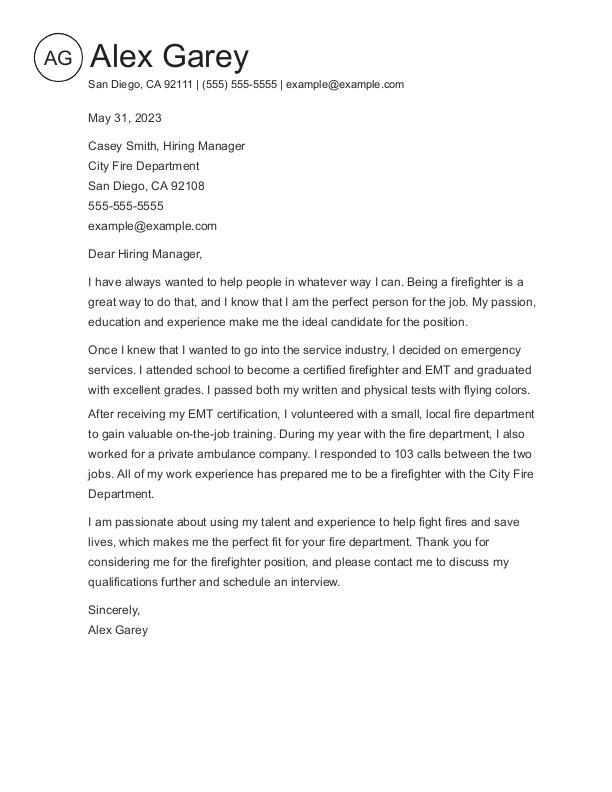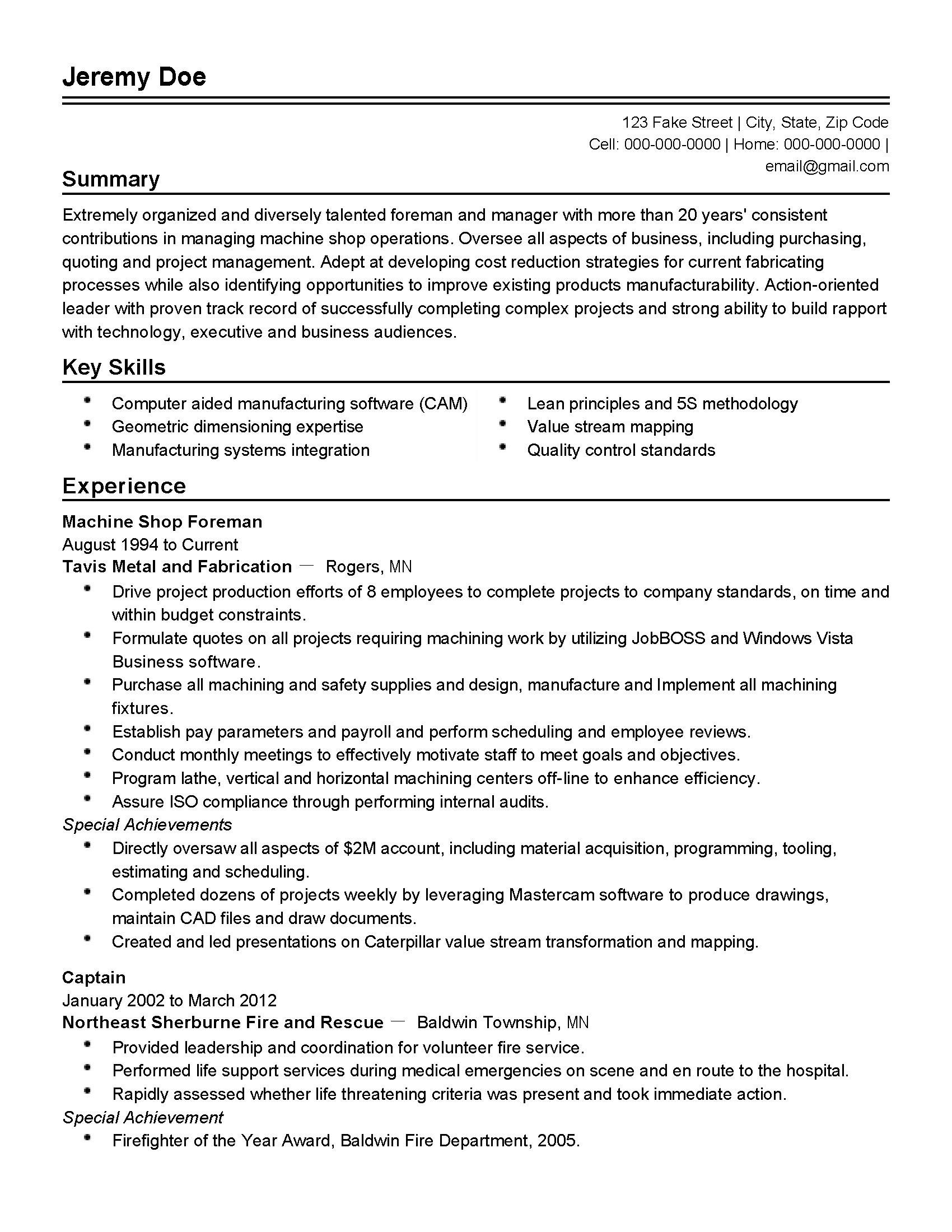Why this resume works
- Quantifies accomplishments: The resume quantifies accomplishments with specific metrics, like saving 120 lives and reducing risks by 30%, illustrating a clear impact in each role.
- Highlights industry-specific skills: Industry-specific skills are highlighted through practical experiences such as hazardous material handling and incident command, which emphasize the candidate’s expertise in firefighting and emergency services.
- Showcases career progression: Career progression is showcased by roles that increase responsibility, moving from fire safety inspections to leading training drills and performing complex rescue missions.
More Firefighter Resume Examples
Check out our firefighter resume examples to showcase your emergency response skills, teamwork, and relevant certifications. These firefighting resume samples will guide you in creating a strong resume that meets industry standards.
Entry-Level Firefighter
Why this resume works
- Features education section: The education section stands out with clear formatting and honors, effectively showcasing academic achievements that are crucial early in the candidate’s career.
- Touches on accomplishments: Accomplishments such as decreasing fire incident rates by 10% highlight the job seeker’s exceptional performance and contributions within their field.
- Shows leadership skills: Strong leadership skills are highlighted through experience training new recruits and contributing to community safety drills.
Mid-Level Firefighter
Why this resume works
- Includes a mix of soft and hard skills: Showcases a balanced skill set by highlighting technical firefighting expertise and strong interpersonal skills through training new recruits and conducting safety workshops.
- Hones in on real impact: Demonstrates tangible results and value to potential employers by referencing specific achievements like reducing incident response time by 15%.
- Demonstrates language abilities: Language abilities are emphasized with proficiency in English, Spanish, and French, underscoring cross-cultural communication skills essential for international collaboration.
Experienced Firefighter
Why this resume works
- Showcases impressive accomplishments: Effectively presents significant achievements, such as reducing fire incidents by 20% and receiving multiple awards, emphasizing a strong impact at senior levels.
- Focuses on work history: The chronological resume format clearly outlines an extensive work history, highlighting progressive roles in emergency services and demonstrating steady career advancement.
- Sections are well-organized: Sections are neatly organized with bullet points and clear headers, making it easy to scan through responsibilities and achievements quickly.
Firefighter Resume Template (Text Version)
Mason Hughes
Eastside, WA 98004
(555)555-5555
Mason.Hughes@example.com
Professional Summary
Highly skilled firefighter with 9+ years of experience in firefighting, emergency response, and rescue operations. Proven track record of enhancing safety protocols, reducing fire incidents by 35%, and leading successful rescue missions.
Work History
Firefighter
Springfield Fire Department – Eastside, WA
February 2019 – February 2025
- Extinguished fires, saving 50+ properties annually
- Conducted safety inspections, reducing risks by 30%
- Led training drills, improving response times by 20%
Rescue Operations Specialist
Central City Emergency Services – Tacoma, WA
March 2015 – February 2019
- Performed 150+ rescue missions, saving 120 lives
- Trained volunteers, optimizing team efficiency by 40%
- Maintained equipment, ensuring 100% operational readiness
Fire Safety Inspector
City Safety Solutions – Silverlake, WA
February 2012 – February 2015
- Inspected 200+ buildings, improved safety compliance by 50%
- Developed safety protocols, reducing fire incidents by 35%
- Conducted fire drills, increasing preparedness by 25%
Skills
- Firefighting
- Emergency Response
- Rescue Operations
- Fire Safety Training
- Incident Command
- Hazardous Material Handling
- Fire Inspection
- Public Safety Protocols
Education
Master’s Degree Fire Science
State University Springfield, Illinois
May 2012
Bachelor’s Degree Public Safety Administration
National College Shelbyville, Illinois
May 2010
Certifications
- Certified Firefighter I & II – National Fire Protection Association
- Hazardous Materials Operations – Fire Service Certification Board
- Advanced First Aid – Red Cross
Languages
- English – Beginner (A1)
- Spanish – Intermediate (B1)
- French – Beginner (A1)
Popular Skills for a Firefighter Resume
A well-organized resume skills section is essential to highlighting the range of abilities required for a firefighter. Both hard skills, such as emergency response techniques, and soft skills, like teamwork and problem-solving, are crucial for excelling in this position.
Below are a few of the top soft skills frequently listed on firefighter resumes.
| Soft Skills | % of resumes with this skill |
|---|---|
| Stress tolerance and resilience | 48.40% |
| Leadership and supervision | 29.76% |
| Community relations | 20.73% |
| Public speaking | 14.67% |
| Relationship building and management | 12.50% |
Here are a few examples of hard skills frequently included on firefighter resumes.
| Hard Skills | % of resumes with this skill |
|---|---|
| Structural firefighting | 44.80% |
| Fire safety | 42.74% |
| First aid certified | 41.06% |
| Vehicle extrication | 28.80% |
| Fitness and agility | 22.88% |
Related Resume Guides
Advice for Writing Your Firefighter Resume
Explore our tips on how to write a resume for a firefighter position and learn how to effectively highlight your bravery, skills, and dedication to public safety. Dive into advice tailored to ensure your resume stands out in the fire service industry.
Write a strong professional summary
A professional summary introduces your resume by showcasing your skills, experience, and achievements. For seasoned firefighters, it highlights years of service, specialized training, and key accomplishments in the field, making a strong first impression by quickly conveying why you are an ideal candidate.
For newcomers to firefighting or those with limited experience, a resume objective is more appropriate. This section should emphasize your passion for the job, relevant education or certifications, and any volunteer work or internships related to firefighting. It sets clear career goals and shows enthusiasm for joining the fire service.
When crafting your professional summary or objective, use action verbs such as “led,” “trained,” “responded,” or “rescued.” Highlight specific skills like emergency response, teamwork, and physical fitness. Organize this section with bullet points or concise sentences to keep it clear and impactful.
Firefighter resume summary examples
Entry-level
Recent fire science graduate with comprehensive training in fire suppression, emergency medical response, and hazardous material handling. Certified in CPR and First Aid, with hands-on experience from volunteer firefighting and internship programs. Eager to apply foundational skills and contribute to community safety while gaining further expertise in firefighting.
Mid-career
Dedicated firefighter with over 7 years of experience responding to various emergencies including structural fires, vehicle accidents, and natural disasters. Proficient in advanced rescue techniques, fire investigation procedures, and incident command systems. Recognized for quick decision-making abilities, teamwork, and commitment to ongoing professional development.
Experienced
Seasoned firefighter with over 15 years of service, specializing in leadership roles such as fire captain. Extensive experience in managing large-scale emergency operations, training junior firefighters, and implementing fire prevention programs. Certified Fire Officer I & II with a proven track record of enhancing department efficiency and improving community safety through strategic initiatives.
Firefighter resume objective examples
Recent graduate
Dedicated and physically fit recent fire science graduate seeking an entry-level firefighter position to apply academic knowledge and rigorous training in fire safety, emergency medical response, and rescue operations. Eager to contribute to the protection and safety of the community while gaining practical experience in a dynamic fire department.
Career changer
Motivated professional with a background in military service transitioning into a firefighting career. Bringing strong skills in teamwork, quick decision-making, and crisis management gained from extensive field experience. Looking forward to leveraging these skills in providing effective emergency response and public safety services.
Specialized training
Certified emergency medical technician (EMT) seeking an entry-level firefighter role within a progressive fire department. Committed to combining EMT expertise with firefighting training to deliver comprehensive emergency services, including advanced life support, fire suppression, and public education on fire prevention.
Want to make your firefighter resume stand out? Use our Resume Builder to easily create a professional and eye-catching resume.
Include relevant certifications and training
Listing certifications, licenses, and specialized training is crucial for a firefighter. It shows you have the necessary skills and knowledge to handle the job’s demands. These credentials prove your expertise in areas like fire safety, emergency medical response, and hazardous materials handling. This information helps employers quickly see that you meet their requirements.
Create a dedicated certifications section on your resume to list these credentials prominently. This can enhance your education section and make your qualifications stand out. For example, include certifications like Firefighter I & II from the National Fire Protection Association (NFPA), Emergency Medical Technician (EMT) certification, and Hazardous Materials Awareness and Operations certification.
Organize this section clearly by listing the name of the certification, the issuing organization, and the date obtained. For example:
- Firefighter I & II – National Fire Protection Association (NFPA)
- Emergency Medical Technician (EMT) – National Registry of Emergency Medical Technicians (NREMT)
- Hazardous Materials Awareness and Operations – International Association of Fire Fighters (IAFF)
- Advanced Cardiac Life Support (ACLS) – American Heart Association
Highlighting these details will make it easy for hiring managers to see your readiness for the role.
Example of a certifications section
Firefighter I Certification
Issued by: National Fire Protection Association (NFPA)
Issued 2022
Emergency Medical Technician (EMT)
Issued by: National Registry of Emergency Medical Technicians (NREMT)
Expires 2025
Hazardous Materials Operations Level
Issued by: International Association of Fire Fighters (IAFF)
Issued 2021
Advanced Cardiac Life Support (ACLS)
Issued by: American Heart Association
Expires 2023
Fire Instructor I
Issued by: Pro Board Fire Service Professional Qualifications System
Issued 2020
We recommend using one of our professional resume templates to easily create a polished resume that showcases your skills and qualifications.
Showcase your work experience
Displaying relevant work experience on a firefighter resume is essential for highlighting your abilities and qualifications. It allows potential employers to understand how your prior positions have equipped you for the job.
Always arrange your work experience in reverse chronological order, placing the most recent role first. Include details such as job title, employer’s name, location, and employment dates to ensure your resume stands out. Use concise, action-oriented bullet points that emphasize measurable outcomes.
For instance, indicate how you enhanced response times or minimized fire damage through swift actions. Include key duties like responding to emergency calls, executing search and rescue missions, providing on-site medical care, operating firefighting apparatus, and performing fire safety assessments.
When detailing skills and accomplishments, concentrate on those pertinent to firefighting. Provide specific instances such as “Led a team of 5 firefighters during a major incident” or “Conducted over 100 fire safety presentations in local schools.” This method not only outlines your experiences but also demonstrates your ability to achieve concrete results under pressure.
5 firefighter work history bullet points
- Responded to over 300 emergency calls annually, providing rapid and effective fire suppression and rescue operations, resulting in a 98% incident resolution rate.
- Conducted fire safety inspections for 150+ residential and commercial properties per year, identifying hazards and ensuring compliance with local fire codes, reducing fire risks by 25%.
- Delivered community education programs to over 1,000 residents on fire prevention techniques and emergency preparedness, enhancing public safety awareness by 40%.
- Trained and mentored new recruits on firefighting techniques and equipment use, improving team readiness and performance during emergency situations by 20%.
- Maintained firefighting equipment and vehicles, ensuring operational readiness at all times and reducing maintenance-related downtime by 15%.
Using the correct keywords from the job posting can help your resume get past applicant tracking systems (ATS) and catch the eye of recruiters.
Match your resume with the job description
Customizing your resume to align with the job description helps you stand out to employers and pass applicant tracking systems (ATS). To create a targeted resume, identify essential keywords and phrases in the firefighter job posting, paying attention to specific skills, certifications, and responsibilities mentioned.
To ensure an ATS-friendly resume, integrate those terms into key sections. For instance, if the job description references “fire suppression,” ensure this phrase appears in your experience or skills sections.
Rephrasing job posting language can also be beneficial; for example, if it states “Experience with emergency medical services,” you might include a bullet point like, “Provided emergency medical services during fire rescue operations.”
Structure your resume clearly by using headings such as “Skills,” “Experience,” and “Certifications” for easy navigation. Highlight achievements by demonstrating how you have impacted previous roles.
Instead of listing duties, illustrate accomplishments with statements like, “Led a team of firefighters in extinguishing a large warehouse fire, saving $1 million in property.” This effectively showcases both your skills and achievements.
Make sure your resume gets noticed! Our ATS Resume Checker finds problems and gives tips to make your resume better.
Salary Insights for Firefighters
Salaries can vary based on your location and job title. Analyzing industry pay trends can help you compare earnings and make informed career decisions. Check out the details below.
Top 10 highest-paying states for firefighters
Our salary information comes from the U.S. Bureau of Labor Statistics’ Occupational Employment and Wage Statistics survey. This official government data provides the most comprehensive and reliable salary information for firefighters across all 50 states and the District of Columbia. The figures represent the most recent data available as of May 2023.
The national average salary for firefighter is $55,289.
| State | Average Salary |
|---|---|
| California | $87,890 |
| New Jersey | $84,850 |
| Washington | $83,630 |
| New York | $80,950 |
| Illinois | $75,610 |
| Colorado | $74,940 |
| Massachusetts | $72,330 |
| Connecticut | $72,470 |
| Nebraska | $69,020 |
| Oregon | $69,250 |
FAQ
Do I need to include a cover letter with my firefighter resume?
Although not mandatory, including a cover letter with your firefighter resume can give you an advantage. A strong firefighter cover letter allows you to emphasize your passion for firefighting and how your unique skills and experiences make you a strong candidate for the department.
For instance, if you’ve undergone specialized training or have emergency medical services experience, mentioning this can distinguish you from other applicants. You can also highlight any volunteer work or community involvement demonstrating your commitment to public service.
A well-crafted cover letter provides an opportunity to showcase your personality and explain why you’d be a valuable team member. Check out our cover letter examples or use our Cover Letter Generator for assistance.
How long should a firefighter’s resume be?
A one-page resume is generally ideal for a firefighter job application. This length allows hiring managers to swiftly assess your qualifications and experience.
However, if you have significant experience or specialized training, a two-page resume may be appropriate. Emphasize essential certifications, firefighting abilities, and significant incidents you’ve managed.
Prioritize recent positions and achievements to make your application distinctive while maintaining readability.
How do you write a firefighter resume with no experience?
Writing a firefighter resume with no experience requires emphasizing relevant skills, education, and related activities.
Start with your education by listing courses or certifications linked to firefighting, like EMT training or fire science classes, which demonstrate your dedication and foundational knowledge.
Then, showcase transferable skills such as teamwork, physical fitness, problem-solving, and quick decision-making. Mention experiences from sports teams, volunteer work (especially with community safety organizations), or physically demanding jobs.
Include a section for notable achievements or volunteer work. For example, detail any volunteering at a local fire station or participation in community emergency response teams (CERT), including your tasks and the impact of your contributions.
Finally, highlight any additional training or workshops related to emergency services you’ve attended. Tailoring your resume this way will show your commitment and readiness for the role of a firefighter.
Rate this article
Firefighter Resume Example
Additional Resources

Firefighter Cover Letter Examples & Templates
When you’re fighting a fire, you give it all you’ve got. The same should apply to job applications. That means submitting not just a well-written resume, but also a persuasive

Machine Shop Foreman Resume Example
Jeremy Doe123 Fake Street | City, State, Zip Code Cell: 000-000-0000 | Home: 000-000-0000 | email@email.comSummaryExtremely organized and diversely talented foreman and manager with more than 20 years' consistent contributions

Fire Investigator CV Example & Writing tips, Questions, & Salaries
No matter what kind of industry you work in or what kind of job you seek, a well-written CV is the best method of securing a job interview. Those who

Exploring Opinions on Job Satisfaction & Finding Meaning at Work
Work will consume 1/3 of your life. In words: one-third. Getting goosebumps? Me too. That's 90,000 hours over the course of a lifetime. Add in commuting if it applies. The numbers

Medical Laboratory Technologist CV Examples & Templates

Top Firefighting CV Examples
Firefighters offer prevention, safety and rescue to their communities. Making a CV to highlight your vehicle maintenance experience, ladder operation skills and swiftwater rescue knowledge can jump-start your career in
